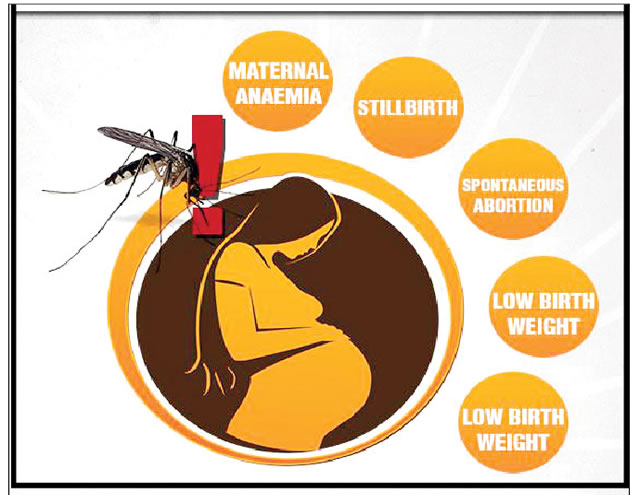Malaria in pregnancy is dangerous, see the doctor!
On its own, pregnancy is risky, as it stretches the body to its last atom of endurance.
Physicians contend that every pregnancy is a risk. It is thus a double whammy when a pregnant woman develops malaria.
The World Health Organisation describes malaria as a parasitic infection transmitted by mosquitoes. It is one of the most devastating infectious diseases, killing more than one million people annually.
General Practitioner, Dr. Idayat Bello, explains that in order for a pregnant woman’s body to carry a foetus to term, her immunity naturally lowers so as not to fight the unborn baby the way it would fight an infection.
“This lowered immunity is what makes pregnant women more susceptible to malaria-causing parasites than the general population. They are more likely to become infected, have a recurrence, or develop severe complications that may lead to death,” Bello says.
As for pregnant women who are HIV-positive, malaria can sound a death knell if it is not tackled as an emergency.
“HIV increases susceptibility to malarial infection and the presence of malaria causes an increase in HIV viral load,” says the Director General of the National Agency for the Control of AIDS, Prof. John Idoko.
Why pregnant women are especially at risk
Experts say that adults who have survived repeated malaria infections throughout their lifetimes may become partially immune to severe malaria.
“However, because of the changes in women’s immune systems during pregnancy and the presence of the placenta, the environment creates new places for parasites to bind,” scientists say.
Indeed, experts warn that malaria infection during pregnancy is a significant public health problem, as it poses serious risks for the pregnant woman, her foetus, and the baby after it has been born.
Bello says malaria parasites can infect the placenta — the only source of the baby’s nourishment — robbing the foetus of nutrients and increasing the chances for low birth weight, pre-term birth and infection.
Consultant Gynaecologist, Dr. Funmi Samuel, says malaria in pregnancy is dangerous to the woman and her unborn baby.
“The malaria parasite is capable of rupturing and destroying the red blood cells. When this happens in a pregnant woman, it could result in severe anaemia, such that she won’t have any capacity to cope with haemorrhage (bleeding) during childbirth, making the pregnant woman more likely to die during delivery,” Samuel says.
She adds that pregnant women who have malaria are at higher risk of developing glucose deficiency in the bloodstream.
“They may also have cerebral malaria, acute kidney injury, liver failure and low blood pressure (hypotension) because of this singular disease,” Samuel says.
She warns that if malaria in pregnancy is not treated, it could lead to deaths of mother and child; or miscarriage, stillbirth and premature birth. And where both the mother and her unborn baby survive all these, the unborn baby may have growth restriction.
“Such babies are usually born with low birth weight, while the mother and the unborn baby may be anaemic.
“Even after delivery, the infant will be susceptible to malaria. That’s why malaria in pregnancy is a medical emergency,” the physician explains.
As serious as this is, the WHO notes that in sub-Saharan Africa (including Nigeria), malaria during pregnancy is responsible for up to 20 percent of low birth weight deliveries and more than 100,000 infant deaths each year!
WHO adds that even if a woman is lucky not to have developed malaria in pregnancy, being bitten by parasitic mosquito is enough to expose the unborn baby to malaria.
Worse still is the fact that a baby who contacts malaria from the womb tends to have fever on a regular basis, which may make him/her become an unhappy child that is always feeling irritated.
“Such babies may also have feeding difficulties, while they may also develop jaundice or anaemia. At the end of the day, even family members who weren’t infected with malaria parasites share the pains of members who do,” Samuel warns.
Bello adds that the liver and spleen of babies who are infected with malaria in the womb could swell beyond their normal sizes, effectively reducing the infant’s immunity and predisposing him/her to repeated and dangerous infections.
How to protect yourself
According to the nhs.uk,
- Use a mosquito repellent on your skin – choose one specifically recommended for use in pregnancy and apply it often, following the manufacturer’s instructions
- Cover your arms and legs all the time.
- Use insecticide to kill any mosquitoes before you go to bed
- Sleep under a mosquito net that has been treated with insecticide and make sure the net is not broken
- Ideally, pregnant women should remain indoors between dusk and dawn
The bottom line: If you are pregnant and ill, see your doctor for prompt diagnosis and effective treatment. Don’t ever attempt to treat any illness at home.
PUNCH.








